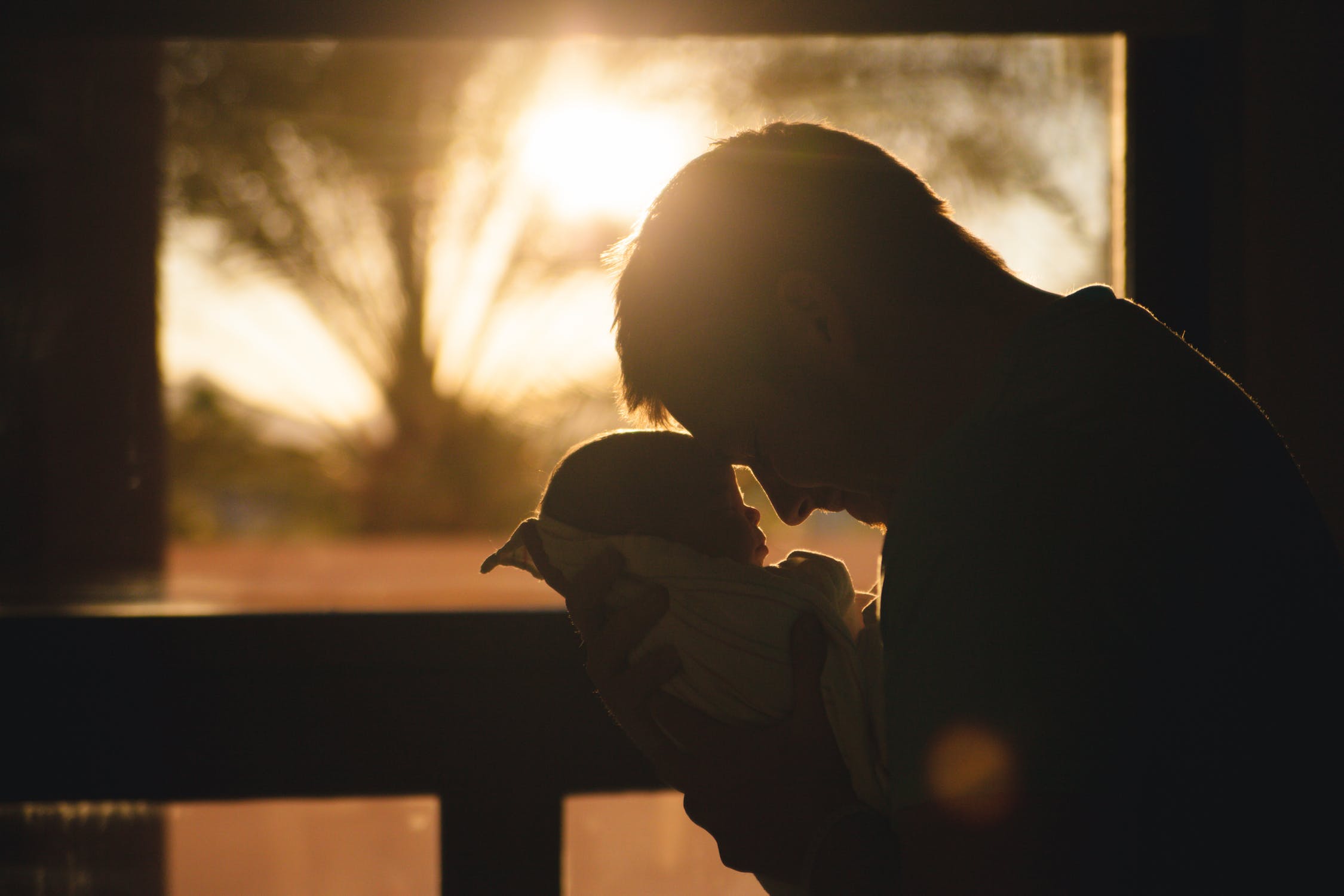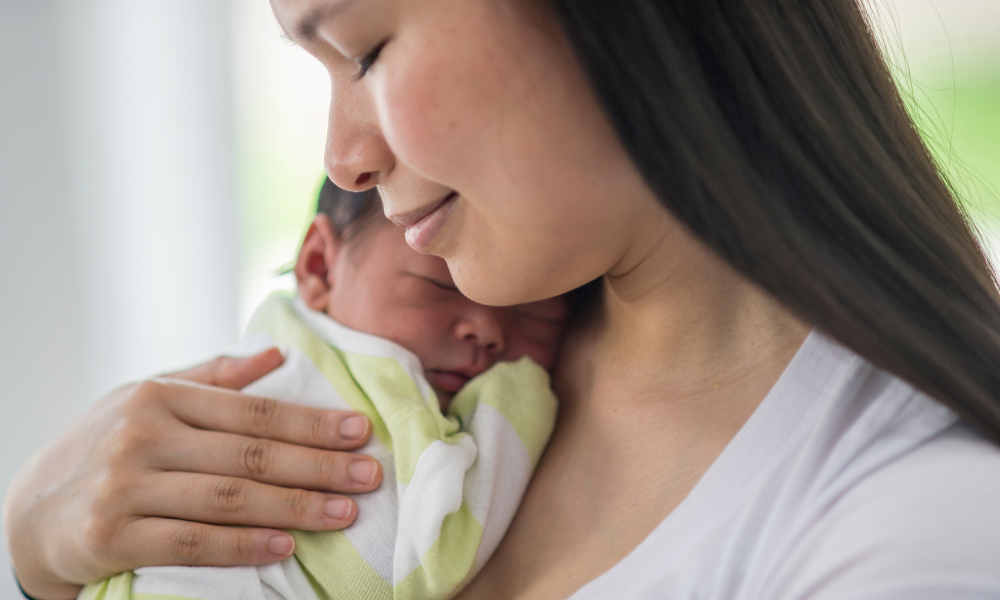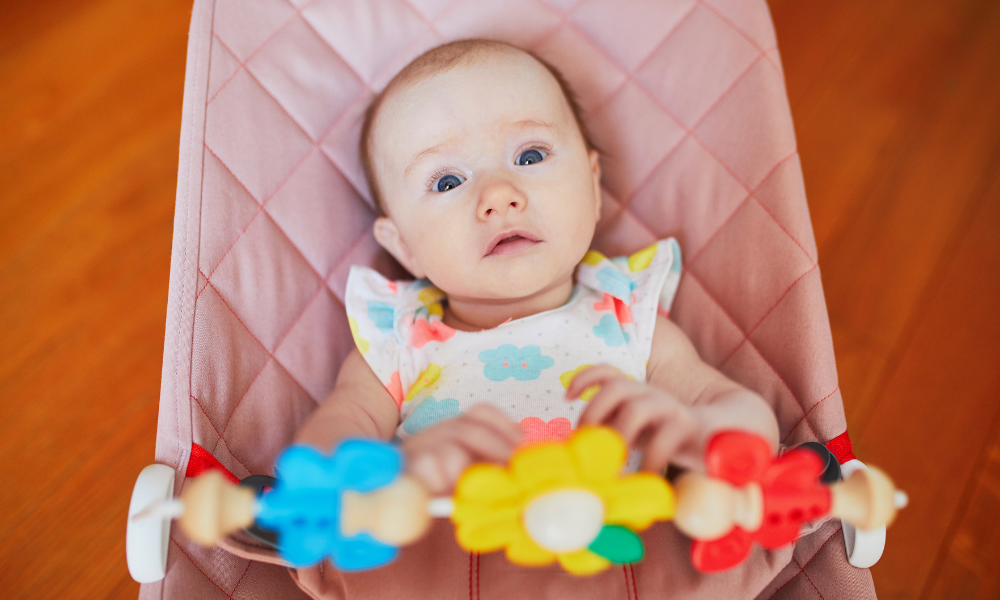Why Your Baby Cries When You Put Her Down

Published Date: 11/02/23
Babies Have a Biological Need to Be Close to You
Have you ever noticed that your newborn can be sleeping comfortably on your chest but as soon as you try to sit down, they wake up crying, insisting that you stand, bounce, or walk around with them? Human nature is amazing and this response is part of the fight or flight response.
If a caregiver is standing up and holding a helpless baby, they are ready in case they need to run away from danger. If they are sitting or laying down, it would take more time to get away.
You may know you're not in danger but your infant doesn't...
Read on to learn more or jump to:
Why does your baby cry when you sit down?
Carrying infants regulates their heartbeat
How much do infants need to be held?
You can't spoil a baby by carrying them
Why Does Your Baby Cry When You Sit Down?
Babies Feel Secure When You're Walking
We can learn a lot about human instinct from our ancestors and other mammals.
Back when we were still living in caves, saber-tooth cats, dire wolves, and giant man-eating birds lurked outside, waiting to pounce. These predators helped shape our development. In the comfort of our homes today we don't fear wild beasts, but human instinct hasn't quite caught up with modern living.
When you're holding your baby and moving, it's theoretically easy for you to run and escape danger. But seated, you'd have a much lower chance of getting away from a tiger looking for its next meal.
Similarly, a study was done showing how baby mice prefer to be held by the nape of their necks by their mothers because it gives them security. Your baby is craving that same sense of safety and security.
Babies and mice also make it easier for mom to escape. Little mice go limp as soon as mama mouse picks them up and our human babies often calm down almost immediately, allowing mom to make a quick getaway. Hopefully that's not really necessary, but if it were, know that your bambino is helping you out.
YOU'LL ALSO LOVE: TIPS FOR INCREASING BREASTMILK SUPPLY
Being Held Affects a Baby's Heartbeat
Research has been done across mammalian species on the effect of carrying one's young and the results aren't surprising.
Carrying an infant has a calming effect, with a distressed baby's heartbeat immediately dropping once securely in their mother's arms. They also stop voluntary movement and cries dissipate.
You can't argue with biology...

Wonder why baby's fall asleep easily while in your arms? Being held helps regulate their heartbeat.
How Much Do Babies Need to Be Held?
Humans are Meant to Carry Our Young
It's notable that humans are a carry species - meaning we're desgined to carry our young.
We have the largest brains of any primate yet our babies rely on us for a much longer period of time than other animals.
We carry our fetuses for about nine months and any woman who's carried a baby to term will likely say they didn't want to be pregnant longer. Well, for human babies to be born with the cognitive and phyiscal development of our closest living relative the chimpanzee, fetuses would have to gestate for an estimated 18 to 21 months! No thank you...
Carrying Infants Promotes Bonding & Development
Babies need to be held a lot. And some babies want to be held all the time.
Dr. Barbara Howard, assistant professor of pediatrics at Johns Hopkins University told WebMD, "Babies like to be held all the time, especially before they can walk on their own. They can look around, they get to see what the parent's doing, which they find totally fascinating, and that's good for mental development."
And there are studies that prove holding your baby promotes positive development. Research led by Dr. Elizabeth Anisfeld at Columbia University gave mothers either an infant carrier at birth or an infant seat. Mothers who received the infant carrier were more responsive to their baby's vocalizations at 3.5 months and the carried babies had more secure attachment bonds at 13 months.
Should You Use Baby Bouncers and Swings?
For most families, carrying an infant 24/7 isn't practical. Even with a great baby carrier you need a break.
Bouncers, swings, and other devices that allow you to put your baby down for a bit are necessary for some, however most of them are not safe sleep environments. Use them for short periods of time when your child is awake and avoid using them as an excuse to not carry your babe.
It's important to keep in mind the fact that babies can't self-soothe, despite what you may have heard. Stay attuned to your infant's cries and vocalizations while they're hanging out in the swing or bouncer.

Occasional use of bouncers or swings can be a welcome relief for parents.
So how much do I need to carry my baby?
There's no set number of hours that's right to carry your infant. Every baby has different needs and every caregiver needs to find a balance between meeting their child's needs and meeting their own.
There are multiple benefits of babywearing, like less crying (definitely for baby, possibly for mom). If a carrier is an option, it's an ideal hands-free way tote your tot.
DON'T MISS: ARE YOU BLOCKING EMPATHY? FIND OUT.
You Can't Spoil a Baby with Love
Children Are Spoiled By Posessions, Not Affection
It's frustrating that people still say, "You're spoiling your baby by holding them."
This tired trope comes from years of misinformation being perpetuated by doctors who told mothers to pick their babies up as little as possible.
We now know that was terrible advice and responding to your baby's cries is nurturing, not spoiling. The benefits of being a responsive caregiver are numerous, and that includes having a baby who is less clingy.
Responsiveness is crucial to help a baby develop secure attachment bonds can have a lifelong impact. In fact, the bond developed between a baby and their caregiver can actually affect romantic relationships in adulthood.
So go on and snuggle your baby and don’t let anyone tell you otherwise. You can’t spoil a baby with love.
FAQs About Crying Babies
How can I stop my baby from crying when I put her down?
Unfortunately, there's no magic answer here. Your baby needs you to hold her to develop a secure attachment and as she develops it, you'll be able to put her down more easily. In the meantime, enlist the help of family and friends whenever possible, and look into a hands-free baby carrier, which can be a life saver when you need to get things done.
Q: What do I do if my baby wants to be held all the time?
If your baby wants to be held all the time your baby is 100% perfectly typical. We've unfortunately been sold a lie about what to expect from babies. Mothers also used to have a lot of help - it was normal for a child to have up to 12 caregivers in the form of extended family and siblings up until relatively recent times. As much as you can, meet your baby's needs and when a friend says, "Is there anything you need?" say "Yes! I could really use [dinner, a baby sitter for an hour, a shower]" Too often we don't speak up and think we're supposed to be able to do it all...we're not!
Q. How do I teach my baby to self-soothe and self-settle?
Like the many myths we've been told about baby sleep, self-soothing is simply not a skill babies have or can be taught. Self-soothing is all about emotional regulation and baby's brains simply aren't developed enough to do that.
What should I do if my baby cries when put down?
Crying is communication and when you put your baby to bed and they cry, they're communicating that they still need to be in your arms. Crying is also completely normal and it will likely take months before your child feels secure being alone. You can practice putting your baby down in the crib during wake times and patting them gently as well as verbally reassuring your little one that you're there and they're safe.
Always make sure your little one isn't hungry, create a healthy sleep environment, ensuring that the room is dark, a comfortable temperature, and there's little noise.
New parents may want to consider that some babies never like to sleep in a crib and think about co-sleeping as an option.
What is the correct way to put my baby down?
Always put your baby on their back to sleep and try to keep your baby on their backs throughout the night. Make sure that the crib is empty before placing your baby down and keep the room at a comfortable temperature for them to fall asleep in.
At what age do babies stop crying when being put to sleep?
All babies will take different amounts of time to stop crying when being put down. Many infants will be through the worst of the crying by four months old. At this age, your baby may start to sleep for longer hours and putting them to sleep may be easier. But, don't be surprised if your little one isn't ready to nap and sleep without being in contact with your body at that age. All babies are different and their sleep patterns change constantly in the first weeks, months, and even years. Just when it seems you've gotten it figured out and your baby's sleeping through the night, an illness, regression, teething, or other change hits and your baby's back to crying at all hours.
Should I put my baby down drowsy, but awake?
New parents are often given the advice to put their infants down drowsy, but awake. The theory is that if you start this pattern early and do it every time, your baby won't cry when place in their crib to sleep and they'll be more likely to sleep through the night.
While you could certainly try this, it seems that for most parents, weeks are spent following this advice and your child is still crying every time they're set down to sleep, and both adults and infants end up with anxiety around bedtime.
How do I know if my baby has colic?
Colic is frequent, prolonged crying by a healthy child who isn't hungry, in need of a clean diaper, or in obvious pain. Colic is difficult, as listening to the noise of a baby cry at all hours of the day and night can lead to anxiety for mom and dad who are already sleep deprived and stressed. If your baby is crying excessively, first call your pediatrician and schedule an appointment to rule out any medical issues or health concerns.
If possible, set up a network of friends and family who you can call on for support. If someone can watch your child while you get out of the house alone for a few hours, it can help you stay calm when dealing with a fussy baby. Taking care of your mental health is crucial for your parenting so pay attention to how you're feeling and call for help when life with a little one gets overwhelming.
By the time you have a four-month-old, colic will generally pass and your infant will be less fussy.
Does feeding a baby cereal in their bottle help them sleep through the night?
Feeding a baby cereal in their bottle to help them fall asleep and wake less often is an old wive's tale that could be dangerous. Not only can it lead to choking, but your baby's body is still developing and their digestive system may not be ready for solids. When you feed a baby cereal or other solids too early, it can lead to health problems later in life, like obesity.
Instead of feeding your baby cereal at bedtime, create a bedtime routine that they become accustomed to and will associate with sleep.
Paper Pinecone is the #1 most trusted childcare directory giving parents access to the best preschools and best daycares near you. Parents always search free and childcare providers always list free. Send inquiries about the best daycares and preschools to [email protected].
This post may contain affiliate links.
ABOUT THE AUTHOR
Crystal is a gentle parenting mama who loves reading, cooking, and exploring new trails with her husband and son. She is from Los Angeles but currently lives in Portland, OR where she is eating all the vegan food. Crystal has been researching best practices in child development, attachment parenting, and baby sleep since her son was born in 2014.



Comments
Does this apply for 5 month olds?
Hi there,
I love this article because it really gives me some a bit of peace of mind. However my 5 month old still doesn't want to be put down. I've had all medical things ruled out and been told he's just an unsettled baby and to meet his needs by holding him if that's what he wants. I get it but it's sooo hard. I live in Australia we have been in lockdown for 2 months now it's just me at home. I'm also worried that now he is not a newborn he will form into a habit ? And he is missing out on that developmental play like practising tummy time, rolling etc... I try to get him on the floor as much as I can but it doesn't last long until he cries to be held. What do you think continue to hold him at this age ? Thanks
Does this apply for 5 month olds?
Hi Rebecca - So sorry you're struggling. Certainly COVID-19 restrictions have made it extra hard for parents who are even more isolated than they typically feel.
As for your child, yes, this applies to 5-month-olds. When you consider that your baby was in the womb for 9 months, 5 months is still a tiny little baby! Some babies are needier than others - some are very high needs. Hold him as much as you can, just go easy on yourself. We don't advocate for letting babies cry, but mama needs a shower too!
Hang in there - it does get easier, and the more support you can give your child now, the more independence they develop later on. You're giving him the security he needs so as he grows, he knows you're always there for him. Sharing some other resources you might find helpful. Good luck!
Surviving a High Needs Baby
Stop Saying Kids Are Resilient & How to Raise Children Who Thrive
Friends daughter is crying to hyperventilation at bedtime
My friend is a new mother of a recently turned 1 year old baby girl. Unfortunately, for the baby's first year the house she was living in with her spouse was very cramped and there was nowhere to place her crib but right next to their queen bed. Perhaps as a result of the stress of living together in such a small space, and also because of unrealized ambition on her part and complacentcy on his part, they' are now separated with her and the baby staying at my girlfriend's house which is large enough to accommodate the baby in her own room.
From what I understand there was never a time when she would go to sleep at night without crying for a lengthy amount of time, and the only way to get her to stop was for her to pickup the baby, hold her, carry her, and soothe and reassure her. But the minute she's put down in her crib asleep or awake, she will inevitably become fully conscious of the separation from mommy and she cries bloody murder. At his could continue for over an hour, even on days where it makes no sense for her to protest so much given how tired she is when she's put in her crib for the night. It doesn't matter how many times mommy comes to check on her, or whether she's alone in her own room or if the crib is next to her mother (as was the case before the separation), she will bolt out this piercing wail that has been honed, crafted and perfected to literally get every living being's attention within 100 yards, and whether human or animal, they start to become anxious and worried about the baby's well being as this type of wail is more suited to indicate a tortured soul than one dealing with separation anxiety.
My friend is a mess, her boyfriend can't handle the constant crying at noon and in the evening, and my girlfriend tends to have her maternal instinct take over her rational therapist-trained mind, finding herself in the position of soothing the baby versus allowing the separation training to commence without some prolonged interruption or setback.
What is she to do? Any help would be inmensely appreciated!
Re: Friends daughter is crying to hyperventilation at bedtime
So sorry your friend is having a tough time.
That said, you hit the nail on the head when you said "maternal instinct" - a mother knows when her baby needs her.
There are a few things to note:
- Emotional needs are just as valid as physical ones. They should be met with the same care and concern that physical needs would. Meeting a child's emotional needs in infancy actually leads to secure attachment and more independence later on in life. The child knows they have a safety net so they're willing to step out on their own.
- There's no need to train a one-year-old to separate. The child has been out of the womb just three months longer than they were inside, and self-soothing is a horrible myth perpetrated on mothers. It leaves them guilt-ridden because their baby can't regulate their emotions, meanwhile nobody actually tells them that babies don't have the brain development needed for emotional regulation. Including an article about it: Training for Sleep Training: Oh Go Self-Soothe…Yourself
- Some babies are needier than others and you absolutely cannot spoil a baby with love and physical affection.
Sounds like co-sleeping may be a good option for your friend, which is actually a biological imperative for mammals - sharing this, which has more details on it: Training for Sleep Training: Evolution Is Spelled P-R-O-X-I-M-I-T-Y
If co-sleeping isn't an option, there are lots of sleep training strategies out there. Though I'm personally not a fan of sleep training, I do understand that for some families, there simply aren't any other options. All involve crying to some degree, it just depends on the method. Some encourage crib training, which is similar to crate training a dog. Basically, you put baby in the crib when they're awake (not at bed or nap), tell them to lay down, and give them a treat when they do. You practice this until they're happy going into the crib. Some involve sitting near the crib touching the baby and gradually moving your seat closer and closer to the door. Some include extinction, where you simply let your baby cry for as long as they do, until the pass out with exhaustion. There are other methods as well that she can look into, but honestly, there's absolutely no guarantee they'll work, every baby reacts to the process differently (based on what you're describing, I would bet that your friend's baby won't react well to it), and often when teething or illness hits or during/after traveling, all the work put into sleep training is undone.
There are no simple solutions here. The baby is doing exactly what she's supposed to do - communicating her emotional needs. Our hope is that babies who have their emotional needs met turn into children and eventually adults who are still capable of communicating emotional needs. We'd all have better relationships if that were the case.
My Situation
I appreciate this, and I feel validated for not wanting to just leave my baby. It truly makes me mad and sick that I have family telling me to let my 6 month old cry alone in the dark til she passes out. I refuse to do that, and I also hate the idea of sleep training but: I'm at an impasse. My daughter is home with me, but I plan to work as soon as a daycare opens up. I have no idea when that could be, and I don't want her having an even more rough transition back to a daycare environment (was in one around 12 weeks up until last month when we moved). She's super attached to me and we cosleep. However, this means I can't move or get up when she's asleep. Literally. I can't get up to pump or use the bathroom. She wakes up if I do. She clearly wants her own space and has been fighting me more and more at bedtime. She falls asleep on her own in the adult bed even. However, my setup isn't safe to leave her in an adult bed unsupervised or without me close to her. I've tried moving her to the crib when she's drowsy but awake, asleep, and deep sleep. Deep sleep gets me more time in the crib. Once she's asleep on the big bed, I move her to the crib with no issues at night. She sleeps maybe 30 minutes and wakes up screaming. I try to console her in the crib, but it doesn't work. She's just awake. Once she's stopped crying, she is WIDE awake and won't go back to sleep anywhere (even by me) for an hour and a half or so. I guess I'm just lost. I don't know what to do. Naps are the same way. She's used to contact naps, but she wakes up immediately when I put her down during the day. My back cannot handle laying down for 12 hours with her or sitting holding her for 3-4 hours a day anymore. I love sleeping by her. I love her being close. I love holding her. I just.. I can't keep up with this.
Honestly you have just
Honestly you have just explained my exact same situation to a T! Everything, ditto except my LO is almost 9 months (we think his 7th tooth is coming in and he's starting to have separation anxiety). I got a 2 hour contact nap this afternoon, then after 2 hours until my LO was passed out enough and transferred to a crib for 30 mins. Feeling desperate but also super against sleep training.